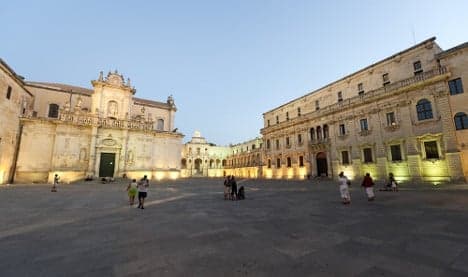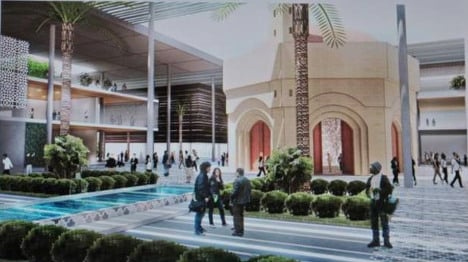How Islamic college plan has split Italian town

Plans to build an Islamic university for 5,000 students in a small town in Italy's heel will help change attitudes towards Muslims, organizers say. But many locals are afraid that it will change the character of Lecce - and are asking who's paying for it.
Carrying a shoulder bag full of books about African culture, Ibrahima Diokhane has come to the centre of Lecce on a damp Saturday morning to meet Giampiero Palladini, the Italian businessman hoping to bring what would be Europe’s first Islamic University to the city.
Diokhane, from Senegal, has lived in Italy for 17 years, the last five of which have been in Lecce, a historic walled city in the heart of Puglia’s Salento region with a bustling student community.
He’s come to offer encouragement for a project, seen by its promoters as “an instrument for peace” but which has divided a city that otherwise prides itself on its openness.
“We need something that could help change people’s attitudes towards being Muslim,” he tells The Local.
At first glance, Italy’s ‘deep south’ might seem like an odd choice for an Islamic University compared to the more prosperous north, where more than half of Italy’s 1.5 million Muslims live. And the 5,000 students will certainly make their presence felt in the town of 95,000 inhabitants.
But for Palladini, a Muslim convert born in Lecce, the location makes complete sense.
“This is not something separate, it’s something that fully blends in with the history of the south,” he tells The Local, referring to a period in the ninth century when parts of Puglia were controlled by Muslims.
“Geographically, we are also closer to the Arab world than we are to some parts of Italy’s north, and we feel this at a psychological level too.”
He describes Puglia, whose president, Nichi Vendola, is one of only two gay regional governors in Italy, the second, Rosario Crocetta, being in Sicily, as a ‘utopia’ when compared to the rest of the country.
“We are very open. For centuries, we have welcomed foreigners. We are generally more relaxed than people in the north.”
Palladini, who also heads up Confime, a confederation for Mediterranean businesses, was speaking after a press conference on Saturday to announce that the project has been registered and land obtained on the outskirts of Lecce to build a campus that will include accommodation, sports facilities and a mosque.
The university, which still needs accreditation from the Ministry of Education, would initially teach courses in philosophy, literature and theology, and would be open to all students in Italy and abroad.

But rising angst over persistent threats from the Isis extremist group has rubbed off on some locals' attitudes to Islam. In this environment, the bid to attract more Muslims to the area, and to an institution that will have Islamic teaching at its core, has fuelled tension in the city.
Paolo Perrone, the mayor of Lecce, told the local newspaper, Quotidiano di Lecce, last week that “at this particular time in history, the city isn’t ready”. Perrone, who was voted Italy's "most loved mayor" in 2013, declined to comment further when contacted by The Local.
Meanwhile Severo Martini, a councillor from the city’s planning unit, says the project has “caused alarm” among residents, especially in the aftermath of the deadly attacks by Islamic extremists at the office of Charlie Hebdo, a satirical magazine, in Paris in early January.
Martini was among the councillors who last month rejected a permit request from Palladini to renovate a former tobacco factory to house the university.
“Our worries are that, at this time, the climate isn’t good for this type of project,” he tells The Local.
“Our other concern was where the funding is coming from. This part wasn’t transparent.”
But despite the objections, the local authority has no influence on whether or not the project will materialize.
The funding of the university is a subject of much controversy. Middle Eastern states' funding of mosques has raised concerns elsewhere in Europe about the promotion of radical forms of Islam. In February, Austria banned foreign funding of mosques.
Palladini is so far vague about where the money will come from. He says he will need €45 million to bring the university into existence, and claims to already have secured a number of pledges. He is not yet revealing any identities, but says they are mostly private sponsors from Arab nations, including Qatar and Kuwait.
He says he’ll firm up those pledges over the next couple of months and shrugs off fears that the money could originate from those funding terrorism or that the university will bring trouble.
“With the likes of Isis, it is a fear that didn’t exist a few years ago,” he says.
“But Muslims are even more afraid right now. We’re all afraid together. People need to understand that the Muslim world isn’t Isis.”
The aim of the university is to promote culture and integration as well as open up the prospects for job opportunities abroad for young Italians.
“You won’t win a war with weapons. The war will be won with culture, science and intelligence.”
Giovanni, a bar owner, agrees.
“Why not? For centuries we’ve welcomed foreigners, Albanians, Greeks, Libyans..." he says, adding that most young people are in favour of the project.
“It could bring cultural and economic benefits. The problem is the older generation. Our city is full of churches and Catholic symbols…this level of diversity is hard for them to accept. But at the end of the day it’s a university, for study, not to bring terrorism.”
Others beg to differ.
“I don’t want it,” says Giuseppe Tondo, who is out of work.
“This is our home. Foreigners come here but they don’t try to fit in. When we emigrated in the 1960s, we adapted to other countries’ customs. They don’t.”
Comments
See Also
Carrying a shoulder bag full of books about African culture, Ibrahima Diokhane has come to the centre of Lecce on a damp Saturday morning to meet Giampiero Palladini, the Italian businessman hoping to bring what would be Europe’s first Islamic University to the city.
Diokhane, from Senegal, has lived in Italy for 17 years, the last five of which have been in Lecce, a historic walled city in the heart of Puglia’s Salento region with a bustling student community.
He’s come to offer encouragement for a project, seen by its promoters as “an instrument for peace” but which has divided a city that otherwise prides itself on its openness.
“We need something that could help change people’s attitudes towards being Muslim,” he tells The Local.
At first glance, Italy’s ‘deep south’ might seem like an odd choice for an Islamic University compared to the more prosperous north, where more than half of Italy’s 1.5 million Muslims live. And the 5,000 students will certainly make their presence felt in the town of 95,000 inhabitants.
But for Palladini, a Muslim convert born in Lecce, the location makes complete sense.
“This is not something separate, it’s something that fully blends in with the history of the south,” he tells The Local, referring to a period in the ninth century when parts of Puglia were controlled by Muslims.
“Geographically, we are also closer to the Arab world than we are to some parts of Italy’s north, and we feel this at a psychological level too.”
He describes Puglia, whose president, Nichi Vendola, is one of only two gay regional governors in Italy, the second, Rosario Crocetta, being in Sicily, as a ‘utopia’ when compared to the rest of the country.
“We are very open. For centuries, we have welcomed foreigners. We are generally more relaxed than people in the north.”
Palladini, who also heads up Confime, a confederation for Mediterranean businesses, was speaking after a press conference on Saturday to announce that the project has been registered and land obtained on the outskirts of Lecce to build a campus that will include accommodation, sports facilities and a mosque.
The university, which still needs accreditation from the Ministry of Education, would initially teach courses in philosophy, literature and theology, and would be open to all students in Italy and abroad.

But rising angst over persistent threats from the Isis extremist group has rubbed off on some locals' attitudes to Islam. In this environment, the bid to attract more Muslims to the area, and to an institution that will have Islamic teaching at its core, has fuelled tension in the city.
Paolo Perrone, the mayor of Lecce, told the local newspaper, Quotidiano di Lecce, last week that “at this particular time in history, the city isn’t ready”. Perrone, who was voted Italy's "most loved mayor" in 2013, declined to comment further when contacted by The Local.
Meanwhile Severo Martini, a councillor from the city’s planning unit, says the project has “caused alarm” among residents, especially in the aftermath of the deadly attacks by Islamic extremists at the office of Charlie Hebdo, a satirical magazine, in Paris in early January.
Martini was among the councillors who last month rejected a permit request from Palladini to renovate a former tobacco factory to house the university.
“Our worries are that, at this time, the climate isn’t good for this type of project,” he tells The Local.
“Our other concern was where the funding is coming from. This part wasn’t transparent.”
But despite the objections, the local authority has no influence on whether or not the project will materialize.
The funding of the university is a subject of much controversy. Middle Eastern states' funding of mosques has raised concerns elsewhere in Europe about the promotion of radical forms of Islam. In February, Austria banned foreign funding of mosques.
Palladini is so far vague about where the money will come from. He says he will need €45 million to bring the university into existence, and claims to already have secured a number of pledges. He is not yet revealing any identities, but says they are mostly private sponsors from Arab nations, including Qatar and Kuwait.
He says he’ll firm up those pledges over the next couple of months and shrugs off fears that the money could originate from those funding terrorism or that the university will bring trouble.
“With the likes of Isis, it is a fear that didn’t exist a few years ago,” he says.
“But Muslims are even more afraid right now. We’re all afraid together. People need to understand that the Muslim world isn’t Isis.”
The aim of the university is to promote culture and integration as well as open up the prospects for job opportunities abroad for young Italians.
“You won’t win a war with weapons. The war will be won with culture, science and intelligence.”
Giovanni, a bar owner, agrees.
“Why not? For centuries we’ve welcomed foreigners, Albanians, Greeks, Libyans..." he says, adding that most young people are in favour of the project.
“It could bring cultural and economic benefits. The problem is the older generation. Our city is full of churches and Catholic symbols…this level of diversity is hard for them to accept. But at the end of the day it’s a university, for study, not to bring terrorism.”
Others beg to differ.
“I don’t want it,” says Giuseppe Tondo, who is out of work.
“This is our home. Foreigners come here but they don’t try to fit in. When we emigrated in the 1960s, we adapted to other countries’ customs. They don’t.”
Join the conversation in our comments section below. Share your own views and experience and if you have a question or suggestion for our journalists then email us at [email protected].
Please keep comments civil, constructive and on topic – and make sure to read our terms of use before getting involved.
Please log in here to leave a comment.